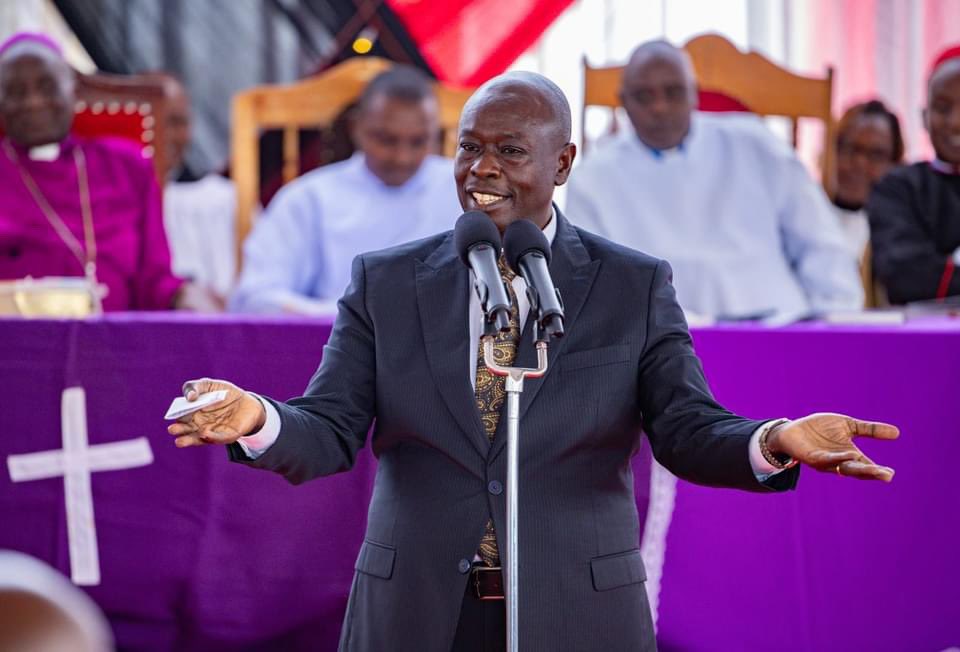By THE DISPATCH DIGITAL
In a surprising turn of events, Deputy President Rigathi Gachagua publicly apologised to President William Ruto during a church service held at the Deputy President’s official residence in Karen, Nairobi, on Sunday. The event, held in a space that once served as a spiritual refuge for Ruto and his wife Rachel during the height of political tensions with former President Uhuru Kenyatta, saw Gachagua seeking to mend fences with his boss.
Gachagua’s apology comes against a backdrop of strained relations between the two leaders, reportedly fuelled by disputes over public procurement contracts. Gachagua had previously been critical of alleged corruption involving inflated government tenders, and his growing influence in Mount Kenya politics has been a point of contention within the Ruto administration.
While some view the apology as a softening of Gachagua’s stance, political insiders suggest it could be a strategic shift. Having ascended to the role of Deputy President with little prior influence in his home region, Gachagua has since become a dominant force in Mount Kenya, commanding considerable political sway ahead of the 2027 elections.
This rise in power has made Gachagua a target not only for President Ruto but also for political rivals within his own Central Kenya backyard, who fear his growing influence. Figures such as Ndindi Nyoro, Mwangi Kiunjuri, and Kimani Ichung’wah, who also have ambitions in the region, have been quietly working against him, positioning themselves as challengers for the Kikuyu leadership.
Gachagua’s political manoeuvring has drawn criticism from both allies and opponents. Pro-Ruto United Democratic Alliance (UDA) politicians, along with opposition Orange Democratic Movement (ODM) members, have launched attacks against Gachagua, accusing him of tribalism. However, public sentiment has shifted, with many citizens accusing politicians of using the law as a smokescreen for their own corruption schemes. The debate surrounding Gachagua has ignited broader discussions about political integrity, with President Ruto himself being linked to questionable deals, including the controversial management of airports and healthcare programmes.
As impeachment whispers grow louder, several figures are being touted as potential successors to Gachagua. Among them are Raila Odinga, the opposition leader who has garnered support for the impeachment from ODM MPs, and Ndindi Nyoro, who has carefully distanced himself from direct criticism of Gachagua while quietly supporting moves against him. Other potential candidates include Kimani Ichung’wah, Majority Leader in Parliament, and Interior Minister Prof. Kithure Kindiki, who enjoys backing from Ruto’s Kalenjin allies. Principal Cabinet Secretary Musalia Mudavadi has also been mentioned as a possible replacement, though he is seen as lacking the political charisma of his father.
The unfolding drama between Ruto and Gachagua is emblematic of the deeper power struggles within Kenya’s political elite, with tribal loyalties and personal ambitions clashing in the lead-up to the next general election. As the situation evolves, it remains to be seen whether Gachagua’s apology marks the beginning of a reconciliation or merely a tactical retreat in a broader battle for political survival.
-
Sale!

CURING HYPERTENSION: Simple Healing Secrets Revealed
Original price was: $20.00.$7.00Current price is: $7.00. Add to basket -
Sale!

Diabetes Reversal: Stop Medication and Live Worry-Free For Life
Original price was: $20.00.$5.00Current price is: $5.00. Add to basket -
Sale!

The Rise of the Silent
Original price was: $7.00.$3.00Current price is: $3.00. Add to basket -
Sale!

Win Back Your Financial Freedom: A Guide to Build Your Wealth
Original price was: $7.00.$3.00Current price is: $3.00. Add to basket




